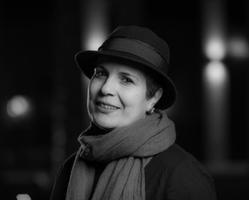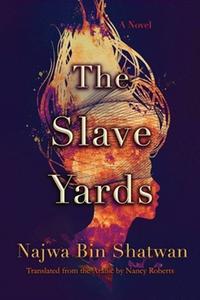
|
|
| photo: Bernard Jarrett | |
Najwa Bin Shatwan is a Libyan academic and novelist, author of The Horses' Hair (2005), Orange Content (2008) and The Slave Yards (in Arabic, 2016), in addition to collections of short stories, plays and contributions to anthologies. She obtained a master's degree in education from Garyounis University in Benghazi, Libya, and has a doctoral degree in humanities from Sapienza University of Rome, Italy. Her story "The Sharp Bend at Al-Bakur" won the ArabLit magazine Story Prize in 2019. Her story collection Catalogue of a Private Life won the English PEN Translates Award in 2019. The English translation of The Slave Yards, shortlisted for the 2017 International Award for Arabic Fiction, was recently published by Syracuse University Press.
On your nightstand now:
There are a number of them, some paper, others on e-reader, all of them literature in translation. I have a bad habit of reading several things at once. Then I mix them up in my head and come up with a new book that doesn't exist!
Favorite book when you were a child:
I was born into an illiterate family, and grew up in a house where there were no books, and of course, no library. I didn't discover reading until I was in middle school and high school, when I began borrowing books from a neighbor boy and a girlfriend of mine. I read Leo Tolstoy's Anna Karenina and Victor Hugo's The Hunchback of Notre-Dame, which dazzled me. This was my first introduction to the world of literature.
Your top five authors:
Gabriel García Márquez, Eduardo Galeano, Ágota Kristóf, Italo Calvino, Abdulrahman Munif and Anton Chekhov.
Books you've faked reading:
The two books I've faked reading are The Green Book written by Muammar Gaddafi, which was mandatory reading in Libya's schools and universities, and Naguib Mahfouz's Children of Gebelawi.
 Books you're an evangelist for:
Books you're an evangelist for:
The Book of Embraces by Eduardo Galeano, The Notebook by Ágota Kristóf, The Pigeon by Patrick Süskind and Absent by Iraqi novelist Batoul al-Khudairi.
Book you've bought for the cover:
Actually, I've never been drawn to a book just on account of the way it looks. It's happened with clothes, food and friends, but never with books.
Book you hid from your parents:
Since my parents were illiterate, it made no difference whether they saw the books I had or not. However, I did hide books later from the authorities. These include the Bible, which I sneaked across the Libyan-Egyptian border once, as well as The Prince by Machiavelli and Salman Rushdie's The Satanic Verses.
Book that changed your life:
The Qur'an. It determined the course of my life in some senses even before I was born, since it was the book my family held sacred. Then after I was born, I was required as a female to submit to all Qur'anic rulings that pertained to women, such as inheriting only half what a male would, and not having my testimony be admissible in a court of law unless it was backed up either by another female, or a man. Then there were the exclusionary social rules that followed from such teachings, and being viewed as inferior to men in intelligence, piety and overall abilities. I still marvel at how a single book could impact a person's life so completely.
Favorite line from a book:
"Sometimes I feel defeated, but I get up again. I don't know why and I don't know how. But I get up." --Eduardo Galeano
Five books you'll never part with:
The books in question are books I borrowed, and unfortunately, didn't steal but gave back to their owners! They include Les Misérables by Victor Hugo, Snow by Orhan Pamuk, Anna Karenina by Leo Tolstoy and everything ever written by Libyan novelist Sadeg al-Nayhum.
Book you most want to read again for the first time:
One Hundred Years of Solitude by Gabriel García Márquez.
Books you wish you'd written yourself:
The Notebook by Ágota Kristóf and The Daughters of Allah by Nedim Gürsel.

